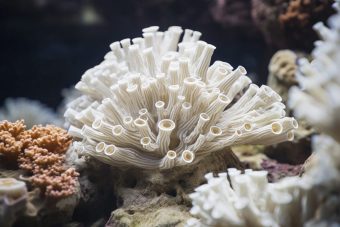Summer has not officially begun yet, but many are already packing their bags for destinations where turquoise seas await. Summer tourism is no longer just about sunbathing, splashing in the shallows, and relaxing on the surface of the sea. Activities such as diving are becoming increasingly popular and accessible around the world. However, unless stricter measures are urgently taken to protect seas, oceans, and their marine life, tourists diving beneath the surface may soon be left without the breathtaking sights they expect today.
Due to intense tourism and increasingly evident climate change, coral reefs across the globe are under severe pressure and threat. Excessive numbers of visitors, unsustainable diving and fishing practices, pollution, and ocean warming are causing coral bleaching and death.
Coral reefs are among the richest and most important ecosystems on the planet. They are home to more than 4,000 species of fish, corals, and other marine organisms. Interestingly, although they cover only about one percent of the world’s ocean surface, they are home to at least 25 percent of all marine life. According to the U.S. National Oceanic and Atmospheric Administration (NOAA), healthy coral reefs are vital to the nutrition of coastal communities and also generate billions of dollars in tourism and recreation. In addition, coral reefs are a crucial source of compounds used in developing medicines for various diseases, and their full medical potential has yet to be explored.

One of the organizations dedicated to the protection and restoration of coral reefs is Africa Foundation, which, in collaboration with the company &Beyond, is implementing the “Oceans Without Borders” program. Launched in October last year, the project focuses on restoring coral reefs around Mnemba Island, located just off the coast of Zanzibar, Tanzania. The goal is to restore damaged coral reefs and increase their coverage by at least 10 percent by the year 2027.
A particularly valuable aspect of the project is the involvement of local communities, and the most inspiring story comes from Atuva Omar – the only woman in Zanzibar engaged in coral transplantation diving. In an interview with the BBC, Atuva shared her deep connection to the ocean, which is her home just three kilometers from Mnemba Island. She observed daily how climate change, overfishing, and mass tourism were destroying the coral reefs around her, so she decided to take an active role in their restoration.
As part of the project, she was trained in diving techniques and coral fragment transplantation onto artificial reefs, which serve as new habitats and help restore life to the marine ecosystem. The dedication and courage of this young woman have become a symbol of hope for preserving these precious natural treasures, reminding us how much individual action, belief in change, and responsibility toward nature can contribute to protecting our planet. Therefore, as we slowly pack our bags for the seaside, it’s important to be aware that every choice and action we take can have a significant impact on the future of our seas and coral reefs.
Katarina Vuinac

